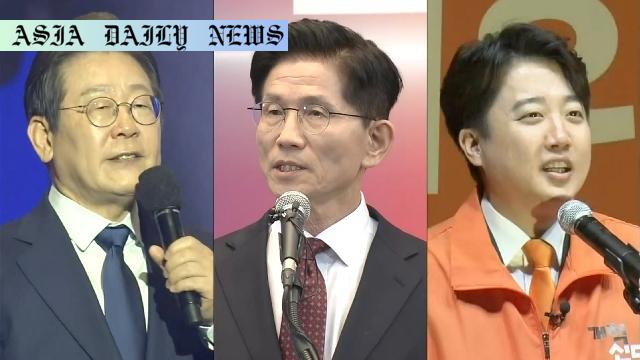South Korean voters head to the polls Tuesday to choose a new president, as candidates wrap final campaigns on Monday.
South Korean voters will go to the polls on Tuesday to elect the next president.
Candidates from ruling and opposition parties make final campaign pushes.
Gallup Korea’s survey suggests narrowing gaps between top candidates.
Efforts to unify conservative parties behind one candidate have failed.

South Korea Prepares for a Major Political Decision
South Korea stands on the cusp of a momentous national decision as voters prepare to elect their new president on Tuesday. With an electorate actively engaged and record voter turnovers anticipated, this election marks yet another chapter in the country’s vibrant democratic tradition. Two primary candidates are vying for leadership in an election that has captured both domestic and international attention: Lee Jae-myung from the largest opposition Democratic Party and Kim Moon-soo of the ruling conservative People Power Party. Each camp has employed strategies to secure every possible vote as South Korea’s public remains deeply divided over pressing issues such as economic recovery, geopolitical challenges, and social welfare reforms.
Tightening Race as Final Campaign Day Concludes
As candidates wrapped up their final campaign day on Monday, opinion polls painted an interesting picture of a narrowing race. Gallup Korea’s latest survey showed that although Lee had been holding a comfortable leading position, the competition has intensified, with Kim cutting the trailing margin to just nine percentage points. Both major campaigns reflect the energy of their parties, leveraging extensive outreach programs to motivate undecided voters. However, election observers believe regional divisions and generational splits will likely play determining roles when the ballots are counted. Additionally, Kim’s campaign witnessed intra-party tensions as efforts to consolidate conservative voters by persuading Lee Jun-seok of the minor Reform Party to drop his candidacy failed, leaving the ruling party vulnerable to vote splits.
Election Stakes in the Broader Context
This election takes place against the backdrop of profound regional and global challenges for South Korea. With rising tensions on the Korean Peninsula, a fluctuating economic recovery post-pandemic, and the economy’s dependency on export markets, choosing the right leader has never been so paramount. Lee promotes progressive agendas such as universal basic incomes, while Kim leans towards economic reforms with an overt focus on traditional conservativism. Voter turnout will greatly determine the path the country takes, and analysts predict that this election will mark a turning point in South Korean politics, shaping its trajectory in the decades to come.
Vote Counting and Post-Election Implications
Vote counting is scheduled to begin immediately after polls close, with results expected by early Wednesday. South Koreans are expected to closely follow the developments, awaiting potentially decisive outcomes that could reshape governance and public policy. Both national and foreign stakeholders view this election critical for stability and global partnerships. The significance of this election cannot be overstated, as it carries implications on South Korea’s domestic advancements, the dynamics of U.S.-South Korea relationships, and its geopolitical posture in dealing with neighboring North Korea and regional powers like China and Japan.
Looking Ahead
Whatever the final outcome of the election, various sectors in South Korea are likely to recalibrate their expectations for future reforms. Whether it involves the continued economic stimuli proposed by opposition candidate Lee or the cautious fiscal path charted by Kim, South Koreans are preparing for the ripple effects of their choice. Political analysts urge the public to not lose sight of long-term goals, regardless of short-term gains or losses.
Commentary
The Critical Importance of South Korea’s Presidential Election
As South Korean voters prepare for what is undoubtedly an election of critical importance, it is fitting to reflect on the significance of this democratic process. The nation has faced a challenging few years due to economic recovery pressures, youth unemployment, and regional geopolitics. This election provides a moment for the electorate to weigh in on the kind of leadership they believe can navigate these challenges effectively. Undoubtedly, this electoral process demonstrates the strength and endurance of South Korea’s vibrant parliamentary democracy.
A Closer Look at the Election Dynamics
What makes this particular electoral battle intriguing is the exceedingly tight race between the leading contenders, with recent polls narrowing the already thin margins. Lee Jae-myung and Kim Moon-soo represent starkly contrasting political ideologies, offering voters a clear ideological choice. While competition is no stranger to South Korean politics, these candidates appear emblematic of Korea’s current political divide—one focused on progressive policies, the other on conservative traditions. The surge of public enthusiasm and speculation on voter turnout reminds us that democratic participation is alive and well in South Korea despite occasional frustrations with polarization.
Looking to the Future Beyond Election Day
Elections are just one component of democracy’s broader framework, and the work of governance begins once the votes are cast. Whoever wins on Tuesday will face the tall task of uniting a deeply divided electorate and steering South Korea toward national and international prosperity. It is a reminder to the world that while democracies are messy, they remain the best means of addressing societal needs and managing change. South Korean citizens deserve applause for their engagement, and the winner will certainly need to draw upon this collective energy to overcome the challenges ahead.


